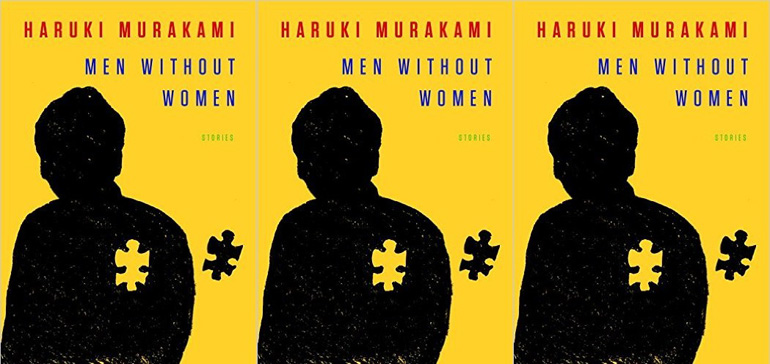Stories Without Women

Men Without Women is a familiar, easily identifiable, and oddly comforting book for the Murakami reader, privileging the emotional landscape of lonely Japanese men through scaffolding characterization, personal idiosyncrasy, and monkey-wrench narratives instead of dramatic Hollywood plot lines, food porn, or cultural didacticism. This long anticipated collection of short stories gives readers the candy they want, only the pieces are smaller (and some might be a choking hazard): there is the quintessential Murakami story formula iterated in many Japanese manga series of the boring male protagonist whose tragically normal life gets turned on its head after meeting an intriguing, audacious, and eccentric female character (or after crossing paths with a stranger with a mysterious past). There is the classic diegetic narrative (in fact, one woman, who tells the story of breaking and entering into the house of her high school crush, one chapter for each time they have sex, is even given the eponymous nickname “Scheherazade” by the tragically normal male protagonist). There is the cishet normativity flowing through the veins of each story like a lifeline. There is perfunctory sex between straight couples and the glaring absence of authentic sexual pleasure (except when part of a nostalgic longing of adolescence). There is the standardized first person point of view. There is the writer-as-narrator device in several stories. And then there are the Murakamian literary motifs that readers will recognize instantly, like hole-in-the-wall jazz bars, mysterious phone calls in the middle of the night, sudden deaths of major characters, mutual infidelity (without betrayal or confrontation), Beatles references, and long, character-developing conversations inside cars, bedrooms, and bars, the narrative site where each story in Men Without Women builds momentum and unpacks its central premise.
Since literary fiction tends to be culturally familiar, it is almost never surreal nor does it strive for entertainment value (since familiarity is antithetical to strangeness and since entertainment—fair or not—often correlates more to voice and Hollywood plot lines), but true to form, Murakami’s Men Without Women manages to be all those things even as it nods to Hemingway. It is a remarkable feat of multimodality that so few writers can pull off. The patented flaw in this collection of short stories is that his main characters tend to be static, simplistic, and boring men whose lives—just like Murakami’s stories—are dreary and predictable without the disruption of routine and the narrative transportation of female characters. Or said another way, the male characters in Men Without Women, like in Murakami’s best known novels, are creatures of habit until they can’t be anymore, which is almost always where the narrative arc takes off. But is this literary device of using female characters as narrative vehicles for delivering male subjectivity the Murakamian crutch?
The female characters in Men Without Women are the catalysts of each short story, which is also true to form for Murakami. In a rare 2004 Paris Review interview, Murakami explains that his female characters are “mediums” who connect and lead the protagonists (always male) to other worlds. Without women, nothing good happens in Men Without Women. For example, in “Drive My Car,” Kafuku, a professional actor and widower, is forced to hire Misaki, a female driver after his vision deteriorates. Misaki not only forces him to overcome his binary prejudice against female drivers, but she also catalyzes his tragic life story and takes him to work every day (the stage being a site of sanctioned group performance and controlled individual psychosis, which feels psychologically authentic for an actor who lost his wife to uterine cancer and before that, infidelity). Readers know nothing about Kafuku before Misaki. Her presence—even as a taciturn driver—engenders his backstory and unpacks his humanity. Through Misaki, Kafuku acquires his own miniature subjectivity.
In “Samsa in Love,” Murakami’s mediocre rendition of The Metamorphosis, the narrator is stuck inside his own self-consciously Kafkasque sequel until a hunchback locksmith arrives, promising to fix his broken lock (which feels like a double entendre for something salacious) and restore his sense of purpose in his dream-story. It’s a surprisingly bad piece of short fiction, even for a remake, that makes no original contributions to the generic discourse of the classic Kafka story, but what stands out beyond the story’s stylistic mediocrity is its faithful reliance on the Murakami formula of the stuck male protagonist temporarily rescued by the crafty, fearless, female minor character, who is the only character strong, interesting, and fleshed out enough to redeem the story’s lackluster content.
And in the strangely phallocentric and unapologetically heteronormative title story “Men Without Women,” the protagonist juxtaposes his undying teenage love for a woman named “M” to his adolescent erections: “And the part of me that’s forever fourteen waits, very patiently, for a gentle west wind to stroke my innocent penis. Wherever the west wind blows, M will surely be found. That’s M to me.” Arousal, innocence, sexuality, and the mythos of adolescence merge together for the narrator as he realizes the pain and heartbreak of loving a woman and then being abandoned by her, which is how he “lost that wonderful west wind.” It’s a head-scratching story for sure that belongs in a B-side compilation in some obsessive university archive. Hopefully, future scholarly projects will examine the conspicuous absence of passionate love (except when reimagined nostalgically), the lack of credible female pleasure, the recurring theme of infidelity (often dyadic, but never scandalous), and the static (and sometimes simplistic) depiction of gender dynamics in Men Without Women because there is so much to excavate in this text, both for what’s emotionally devastating in it and also for what’s culturally problematic about it. At the same time, the short story “Men Without Women” is the perfect microcosm of the collection Men Without Women, both in the way it depicts (straight) Japanese men as lost, lifeless, hopeless, nostalgic, and empty without the women in their lives and also in the way it embodies Murakami’s narrative codependency on female mediums to wake up sleepwalking male characters and connect them to the other side.



